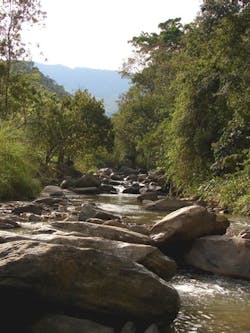Environmental Groups Petition EPA to End Contamination of Urban Rivers
American Rivers, Natural Resources Defense Council (NRDC) and several local partners petitioned the U.S. Environmental Protection Agency (EPA) to make polluters accountable for storm water runoff contamination of several vital urban waterways.
Currently, each rainfall washes sediment, nitrogen and phosphorus off impervious surfaces, like parking lots and rooftops, and into rivers and waterways that communities rely on.
“Runoff pollution contaminates local ecosystems and makes rivers unsafe for people to swim and fish, as well as unhealthy for wildlife,” said Becky Hammer, staff attorney with NRDC.
If the petitions are successful, the responsibility for addressing water pollution will be shared by those corporations and industries creating the pollution problem.
Petitions have been submitted for the following waterways:
- Back River; Baltimore, Md.; submitted by American Rivers, NRDC and Blue Water Baltimore. “We know that most of the potential storm water restoration opportunities are located on private land,” said David Flores of Blue Water Baltimore. “Not enough public land is available to capture and treat the tremendous quantity of storm water that flows off of parking lots at big-box stores and college campuses into our publicly-owned streets, storm drains and streams. Storm water pollution is more efficiently treated at its source, which is the property where is it generated.”
Requiring the government to continue to clean up the pollution that private parties create is both inefficient and unfair—particularly when localities like Baltimore City and County do not control and cannot access the land from which the runoff comes. Requiring the sites creating the pollution to take action themselves is a commonsense solution.
- Army Creek; New Castle County, Del.; submitted by American Rivers, NRDC and Clean Air Council. Contamination can be costly for local communities and municipalities, who are often charged with cleaning up local water pollution. “The economic impact is compounded because coastal and marine waters support millions of jobs that depend upon safe, clean water,” said Jeff Odefey, director of Clean Water Supply Programs at American Rivers.
If the petition is successful, private landowners would be held accountable for the damage they have caused to both Army Creek and the Delaware River, while also being given the opportunity to avoid future damage through the use of proven, cost-effective green infrastructure practices that offer numerous benefits for communities in New Castle County.
- Dominquez Channel and Los Cerritos Channel; Los Angeles; submitted by American Rivers, NRDC and Los Angeles Waterkeeper. “The intended result is cleaner water, healthier communities, and ultimately, improved quality of life in Los Angeles,” said Bruce Reznik, executive director of Los Angeles Waterkeeper. “And EPA exercising its authority and requiring private properties to do their fair share would also be a more evenhanded allocation of clean-up responsibility than the system we have now.”
For each location, the environmental groups petitioned EPA under a provision in the Clean Water Act known as residual designation authority (RDA), which provides that if EPA determines that a category of storm water discharges is contributing to water quality violations, the agency must exercise its RDA and require those dischargers to apply for permits and address polluted runoff. In these cases, the polluters in question are certain commercial, institutional and industrial properties.
Source: American Rivers
